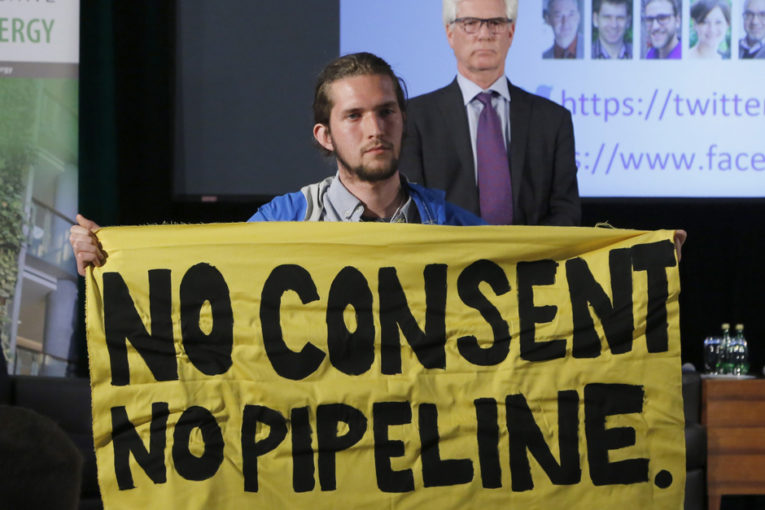
[ad_1]
OTTAWA — A tense political atmosphere has persisted in Ottawa ever since Kinder Morgan Canada Ltd. threatened to halt its highly contentious pipeline project earlier this month, as policymakers wrestle with thorny questions over how to build major infrastructure projects while also addressing environmental concerns.
On Monday evening, First Nations protestors interrupted Natural Resources Minister Jim Carr during a speech at the University of Ottawa, forcing him to cut short his remarks. Carr had said public confidence in Canada’s regulatory regime has “slipped” in recent years due to weak regulatory policy in years past.
The Indigenous activists were joined by a gathering of protestors on the campus grounds, who called on the Liberal government to back off its support of the Trans Mountain pipeline, which it approved in November 2016.
The protest was a stark reminder that Ottawa’s attempts to strengthen the regulatory regime around energy projects is unlikely to diffuse fierce opposition to fossil fuel development in Canada. It also points to potentially insurmountable challenges for oil and gas producers, as worries over climate change impacts take greater precedence in public discourse.
“We’re still operating in a world with two competing and contradictory narratives: one of climate change and our Paris commitments… and on the other hand the realities of the Canadian energy economy,” Michael Cleland, a senior fellow at the University of Ottawa said on Tuesday.
His comments came as part of a two-day energy event hosted by the University of Ottawa that aimed to address some of the most pressing issues facing the energy sector.
Divides over fossil fuel development came into sharp focus in Ottawa after Kinder Morgan threatened to halt all non-essential work on the $7.4-billion Trans Mountain expansion project in early April. The company said further construction wouldn’t go ahead without clear assurances that the project would not be delayed by political and legal wrangling, and gave Ottawa until May 31 to sort out the issue.
The move forced Prime Minister Justin Trudeau to take his firmest stance yet in support of the project, with plans to provide both legislative and financial supports to the company.
The Ottawa chapter of 350.org, an environmental group, which was the main organizer of Monday’s protest against Carr, said Kinder Morgan’s planned investor day on May 9 provides “a critical window to put pressure on Trudeau’s party to push them to back down from their strong position in support of this pipeline,” according to its website.
Criticism of the Liberal government for supporting the project also appears to contrast with the party’s often-repeated mantra that Canada “doesn’t have to choose between the economy and the environment,” amid divisions over energy policy.
Alberta’s NDP government has long said its carbon tax policy, cap on oilsands emissions and phase-out of coal-fired power generation should justify the building of the pipeline, as it will substantially lower overall emissions in the long term.
“Our climate leadership plan means the resources transported by the Trans mountain pipeline are developed under the strongest climate laws on the planet,” Alberta Premier Rachel Notley said via videoconference at the event Tuesday.
Partly in response to pipeline protests, Ottawa has recently introduced Bill C-69, its environmental assessment legislation, to widen consultation on major projects and potentially smooth over discontent.
But industry groups fear the current legislation only threatens to weigh down the approval process without actually improving consultation.
“We’re kind of in a way not achieving that clarity and certainty,” said Chris Bloomer, the president and CEO of the Canadian Energy Pipeline Association.
The group, as well as other industry representatives, have raised concerns over the influence allowed to the environment minister over project approvals, the widened scope of public hearings and a lack of clarity around what projects will be subject to federal approval.
Energy firms have been warning that continued delays in major projects has caused foreign investors to rethink Canada as an investment destination.
“We’re in a bad place right now, and we need to find a way around it,” Bloomer said.
Others are concerned that producers’ margins are being pressured by a steady increase in regulatory requirements.
“The competitiveness improvements that we’re achieving as an industry through ongoing innovation are being largely negated by the continuously increasing cost of new regulations,” Steve Douglas, the vice-president of investor relations at Suncor Energy Inc., told the Senate energy committee last week.
• Email: [email protected] | Twitter: jesse_snyder
[ad_2]
You can read more of the news on source
